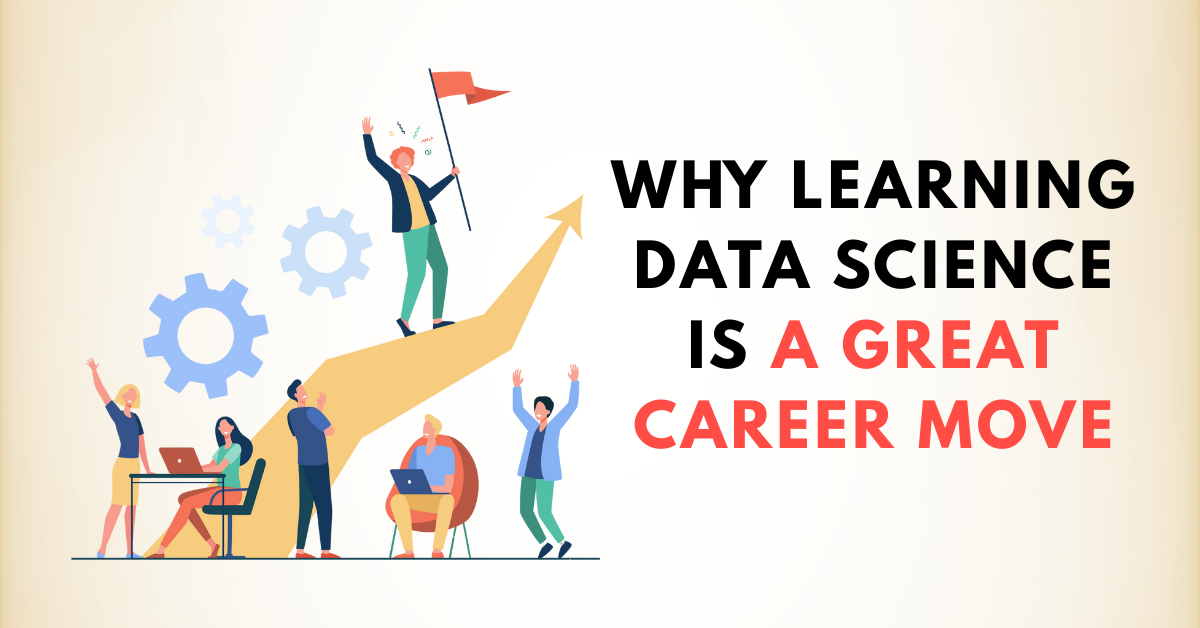Why Learning Data Science is a Great Career Move

In today’s rapidly evolving digital landscape, data is often referred to as the “new oil.” As organizations across the globe strive to harness the power of data to drive decisions, the demand for skilled data scientists has surged. If you’re contemplating a career shift or seeking to enhance your skill set, learning data science could be your gateway to a rewarding and future-proof profession.

Introduction: The Data-Driven World
Every click, transaction, and interaction in the digital realm generates data. This vast influx of information presents both challenges and opportunities. Organizations are increasingly relying on data scientists to interpret this data, uncover patterns, and provide actionable insights. As a result, data science has emerged as one of the most sought-after fields in the job market.
High Demand and Job Security
The Bureau of Labor Statistics projects a 36% growth in data scientist employment by 2031, significantly outpacing the average for all occupations.This surge is driven by the increasing reliance on data-driven decision-making across various sectors.
Furthermore, data science professionals often enjoy job security due to the essential nature of their roles. As businesses continue to prioritize data, the need for skilled data scientists remains robust.

Lucrative Salary Potential
Data science professionals command impressive salaries. According to Glassdoor, the average salary for a data scientist in the United States exceeds $100,000 annually. In India, the average salary stands at ₹8,00,000 per year, with potential for higher earnings based on experience and expertise.
This competitive compensation reflects the specialized skills and value that data scientists bring to organizations.
Versatility Across Industries
One of the most compelling reasons to pursue a career in data science is its applicability across diverse industries. Whether it’s healthcare, finance, retail, or technology, data science plays a pivotal role in driving innovation and efficiency.
For instance, in healthcare, data scientists analyze patient data to improve treatment outcomes. In finance, they develop models to predict market trends and manage risks. This versatility allows professionals to explore various fields and find niches that align with their interests.
Continuous Learning and Growth
The field of data science is dynamic, with new tools, techniques, and technologies emerging regularly. This constant evolution offers professionals opportunities for continuous learning and skill enhancement.
Moreover, data science encompasses various subfields, including machine learning, artificial intelligence, and big data analytics. This breadth allows individuals to specialize in areas that resonate with their passions and career aspirations.
Making a Tangible Impact
Data scientists have the unique opportunity to influence decisions that can lead to meaningful change. By analyzing data, they can identify trends, predict outcomes, and recommend strategies that drive success.
For example, data scientists in environmental science can analyze climate data to inform policies aimed at combating climate change. In education, they can assess student performance data to develop programs that enhance learning outcomes. This ability to make a tangible impact adds a layer of fulfillment to the profession.
Accessibility of Learning Resources
Embarking on a data science journey has never been more accessible. Numerous online platforms offer courses and certifications in data science, catering to beginners and advanced learners alike.
Platforms like edX, Coursera, and DataCamp provide structured learning paths, enabling individuals to acquire the necessary skills at their own pace. Additionally, Coding Coupons offers verified coupon codes, promo offers, and seasonal deals for popular coding and online learning platforms, helping learners save money while upgrading their skills.
Conclusion
Learning data science is more than just acquiring technical skills; it’s about positioning oneself at the forefront of a data-driven future. With high demand, lucrative salaries, versatility across industries, and opportunities for continuous growth, data science presents a compelling career choice.
If you’re ready to embark on this journey, explore the resources available through Coding Coupons to find the best learning platforms and start your path toward becoming a data science professional.
FAQ
1. What is data science?
Data science is the field that combines statistical analysis, machine learning, and data visualization to interpret and manage complex data sets, providing actionable insights for decision-making.
2. Do I need a strong background in mathematics to pursue data science?
While a foundation in mathematics is beneficial, many online courses are designed to teach the necessary concepts, making the field accessible to individuals from various backgrounds.
3. What programming languages are essential for data science?
Python and R are the most commonly used programming languages in data science. SQL is also crucial for database management.
4. Can I transition into data science from a non-technical field?
Yes, many professionals have successfully transitioned into data science by acquiring the necessary skills through online courses and practical experience.
5. How can Coding Coupons assist in my data science learning journey?
Coding Coupons provides verified coupon codes, promo offers, and seasonal deals for popular coding and online learning platforms, helping learners save money while upgrading their skills.
Author Profile
- At Learners View, we're passionate about helping learners make informed decisions. Our team dives deep into online course platforms and individual courses to bring you honest, detailed reviews. Whether you're a beginner or a lifelong learner, our insights aim to guide you toward the best educational resources available online.
Latest entries
 Career GrowthSeptember 28, 2025Coursera vs edX – Which is Better for Coding?
Career GrowthSeptember 28, 2025Coursera vs edX – Which is Better for Coding? Career GrowthSeptember 28, 2025Best Budget-Friendly Coding Bootcamps
Career GrowthSeptember 28, 2025Best Budget-Friendly Coding Bootcamps Career GrowthSeptember 3, 2025Codecademy Discount Code 2025 – Up to 50% OFF Pro Plans
Career GrowthSeptember 3, 2025Codecademy Discount Code 2025 – Up to 50% OFF Pro Plans Online LearningAugust 20, 2025Best Coding Platforms for Beginners – 2025 Guide
Online LearningAugust 20, 2025Best Coding Platforms for Beginners – 2025 Guide






